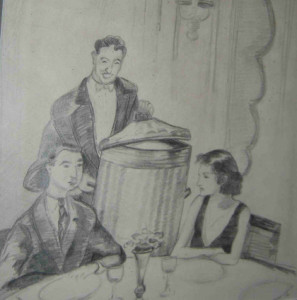Primarily German researchers investigated a cluster of shiga toxin-producing Escherichia coli (STEC) O104:H4 infections after a family party during a large STEC O104:H4 outbreak in Germany. To identify the vehicle we conducted a retrospective cohort study. Stool samples of party guests, and food and environmental samples from the catering company were tested for STEC. We defined cases as party guests with gastrointestinal symptoms and  laboratory-confirmed STEC infection. We found 23 cases among 71 guests. By multivariable analysis consumption of salmon [odds ratio (OR) 15, 95% confidence interval (CI) 2·3–97], herb cream (OR 6·5, 95% CI 1·3–33) and bean salad (OR 6·1, 95% CI 1·4–26) were associated with STEC infection. STEC O104:H4 was detected in samples of bell pepper and salmon. The food handler developed STEC infection. Our results point towards transmission via several food items contaminated by a food handler. We recommend regular education of food handlers emphasizing their role in transmitting infectious diseases.
laboratory-confirmed STEC infection. We found 23 cases among 71 guests. By multivariable analysis consumption of salmon [odds ratio (OR) 15, 95% confidence interval (CI) 2·3–97], herb cream (OR 6·5, 95% CI 1·3–33) and bean salad (OR 6·1, 95% CI 1·4–26) were associated with STEC infection. STEC O104:H4 was detected in samples of bell pepper and salmon. The food handler developed STEC infection. Our results point towards transmission via several food items contaminated by a food handler. We recommend regular education of food handlers emphasizing their role in transmitting infectious diseases.
Epidemiology and Infection / FirstView Article, pp 1-8
M. Diercke, M. Kirchner, K. Claussen, E. Mayr, I. Strotmann, J. Frangenberg, A. Schiffmann, G. Bettge-Weller, M. Arvand and H. Uphoff
